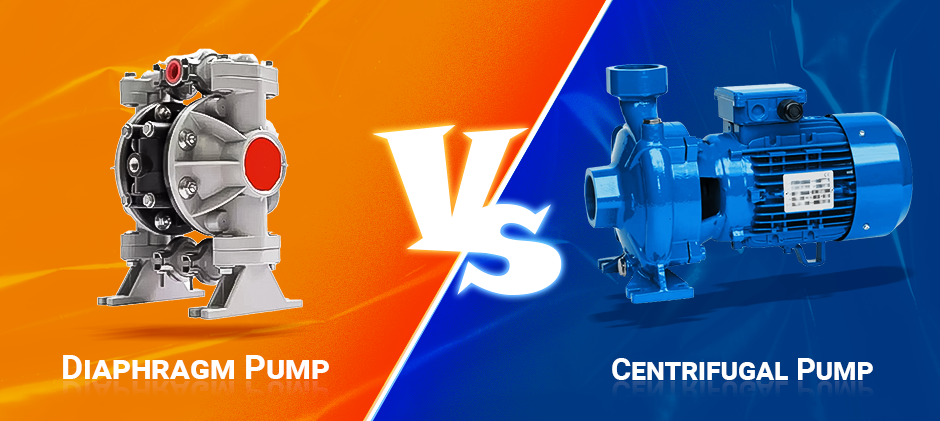In heavy equipment operations, centrifugal pumps and diaphragm pumps are essential tools for fluid handling. However, many machinery owners and operators struggle to differentiate between these two types of pumps. While both serve vital roles, their applications and specifications vary significantly. In this article, I will provide a comprehensive comparison to help you understand the distinctions and make informed purchase decisions for your equipment needs. Let’s dive in.
How Centrifugal Pumps Work in Heavy Machinery
In the heavy machinery world, centrifugal pumps often plays it parts in cooling systems. A centrifugal pump uses rotational energy from an impeller to move fluids. When the impeller spins, the pump creates a centrifugal force, pushing liquid outward through the pump’s discharge. The design works best for moving large volumes of low-viscosity fluids, such as water or oil, with minimal effort. Therefore, a centrifugal pump could circulate coolant to regulate engine temperature. They also play a crucial role in irrigation, dewatering, and transporting liquids in industrial processes.
Top Applications of Centrifugal Pumps in Industrial Equipment
Centrifugal pumps are versatile and widely used across various industries. They play a pivotal role in industries such as water management, oil and gas, agriculture, and even food production.
- Engine Cooling Systems: Circulating coolant to prevent overheating.
- Irrigation Systems: Moving water efficiently for agricultural purposes.
- Wastewater Management: Handling clean or slightly contaminated fluids.
- Oil and Gas Operations: Pumping low-viscosity liquids in large quantities.
- Food and Beverage Industry: Transporting liquids like milk, juices, and syrups in food processing plants. Handling clean water for washing, boiling, and cooling processes. Pumping fluids with food-grade centrifugal pumps that meet hygiene standards.
What are the Disadvantages of a Centrifugal Pump?
Though centrifugal pumps have good versatility, they have certain limitations:
1. Not Suitable for High-Viscosity Fluids: Thick liquids slow the flow rate significantly.
- Limited Suction Power: They rely on priming and struggle with self-priming in dry conditions.
- Sensitivity to Solids: Abrasive particles can damage the impeller over time.
- Reduced Efficiency at Variable Flow Rates: Best performance occurs at a consistent speed.
Understanding Diaphragm Pump Mechanics and Applications
Heavy machinery operators frequently use diaphragm pumps for tasks like slurry management or chemical transfer. Unlike centrifugal pumps, diaphragm pumps operates using a flexible membrane that moves back and forth to create a vacuum. This action draws in and expels liquid, making it ideal for transferring viscous, abrasive, or corrosive fluids. Thus, diaphragm pumps excel in handling solids and gases within the fluid.
Best Uses for Diaphragm Pumps in Heavy Machinery Maintenance
Diaphragm pumps excel in heavy machinery maintenance due to their ability to handle challenging fluids and demanding conditions.
Slurry and mud handling: diaphragm pumps are indispensable at mining and construction sites, efficiently transferring dense, abrasive mixtures without clogging or damage.
Chemical transfer: diaphragm pumps provide unmatched reliability, safely moving corrosive substances like acids, alkalis, or solvents, even in extreme environments.
Fuel transfer: Diaphragm pumps shine by delivering consistent performance with diesel, gasoline, and other fuels, ensuring safe and spill-free handling.
Wastewater treatment: They could effectively pump fluids laden with solid particles, debris, and other contaminants, making them a top choice for managing heavy-duty waste streams.
What are the Disadvantages of a Diaphragm Pump?
Diaphragm pumps also have drawbacks:
- Lower Flow Rates: Not suitable for applications requiring high-speed fluid movement.
- Higher Maintenance: The diaphragm wears out over time and requires replacement.
- Noise Levels: Diaphragm pumps can be noisier than centrifugal pumps.
- Reduced Efficiency for Low-Viscosity Liquids: They perform better with thicker substances.

Comparing Efficiency: Centrifugal Pump vs. Diaphragm Pumps
Centrifugal pumps shine in efficiency when moving large volumes of liquid at a steady rate. However, they lose effectiveness when handling viscous or solid-laden fluids. Diaphragm pumps, on the other hand, excel in versatility, managing fluids with varying consistencies but often at slower speeds. Efficiency ultimately depends on the specific requirements of your machinery is not really instructive when talking about efficiency differences in isolation from practical use. The important thing is to find the right pump for your machine.
Pump Durability and Maintenance: Centrifugal vs. Diaphragm
Both pumps demand regular inspection to ensure long-term durability, but here are some tiny distinctions when taking care of them:
- Centrifugal Pumps: Require less frequent maintenance but are more susceptible to wear from abrasive fluids.
- Diaphragm Pumps: Handle harsh conditions better but need diaphragm replacements over time.
Cost Considerations: Which Pump Offers Better Value Over Time?
The two types of pumps differ slightly in their cost calculations:
- Centrifugal Pumps: Cheaper upfront but less suitable for harsh environments, which may increase repair costs.
- Diaphragm Pumps: Higher initial investment but better suited for challenging applications, reducing downtime and replacement expenses.
The price of a centrifugal pump ranges from $200 to $1,000, depending on size and capacity. On the other hand, diaphragm pumps require a larger initial investment, with prices usually starting at $500 and going up to $3,000 or more. As centrifugal pumps’ performance can decline in harsh environments, potentially leading to higher repair costs over time. On the contrary, diaphragm pumps show good durability and often translate to reduced downtime and lower long-term replacement expenses.
Conclusion
To conclude, centrifugal pumps work best for high-volume, low-viscosity fluids, while diaphragm pumps handle tough fluids and harsh conditions. Assess your specific needs to make a wise decision that optimizes performance and minimizes costs.
Whether you’re dealing with cooling systems, slurry management, or chemical transfers, the right pump can make all the difference in efficiency and durability. If you have a low budget to buy a replacement diaphragm pump, come visit FridayParts.com to get the most cost-effective diaphragm pumps of the best quality!
